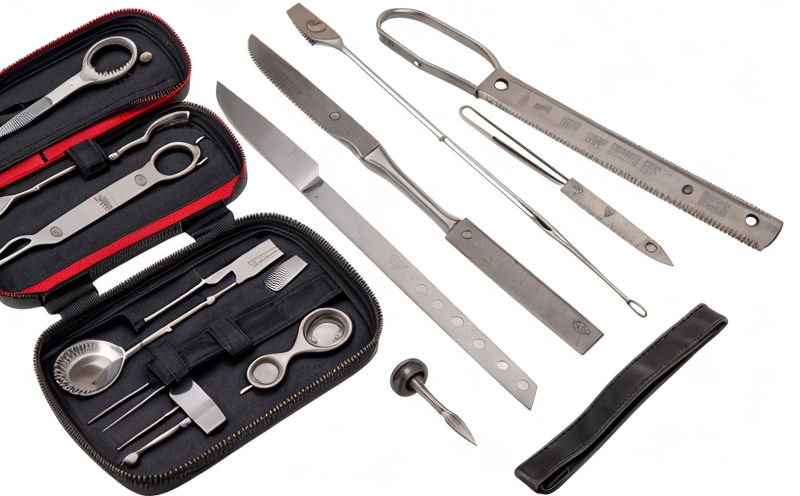Packaging Integrity Testing of Sterile Surgical Instruments
The integrity of packaging is a critical aspect in ensuring that surgical instruments remain sterile from manufacturing to use. Packaging integrity testing involves evaluating the physical and mechanical properties of the materials used in packaging, as well as their ability to protect against contamination during transport and storage.
For surgical instruments, this means checking for any breaches or vulnerabilities in the packaging that could allow microbial ingress. This is especially important given the high stakes involved in maintaining sterility within healthcare settings. The testing process ensures compliance with international standards such as ISO 11607:2019 and ASTM F803-15, which outline the necessary procedures for determining if a medical device package provides sufficient barrier properties.
The typical packaging materials used in this sector include polyethylene (PE), polystyrene (PS), and more advanced biodegradable polymers. Each material has its own set of challenges when it comes to maintaining sterility, especially considering the need for flexibility versus strength or impermeability. For instance, while PE is widely used due to its affordability and ease of processing, it can be less effective at blocking moisture vapor than other materials.
During testing, samples are subjected to various conditions that simulate real-world scenarios such as temperature extremes, humidity exposure, and mechanical stress. These tests help identify potential weaknesses in the packaging design or manufacturing process that could compromise sterility during transit or storage. By identifying these issues early on, manufacturers can make necessary adjustments to improve product performance.
Properly conducted testing not only enhances patient safety but also supports regulatory compliance requirements set forth by bodies like the FDA and EU Medical Devices Directive. It helps ensure that surgical instruments remain sterile throughout their lifecycle, from production lines to operating rooms.
- Thermal Cycling: Samples are exposed to repeated cycles of temperature changes ranging from -20°C to 60°C over a period of time.
- Humidity Testing: Packages are subjected to high humidity levels up to 100% relative humidity for extended durations.
- Mechanical Stress Tests: Packaging is tested under various loading conditions to assess its resistance against crushing, puncturing, or tearing forces.
These tests provide valuable insights into the performance characteristics of different packaging solutions, allowing manufacturers to select the most appropriate materials and designs. The ultimate goal is to balance cost-effectiveness with robust protection capabilities.
Benefits
Packaging integrity testing offers numerous advantages for medical device companies, particularly those involved in surgical instrument manufacturing. One major benefit is the enhancement of patient safety. Ensuring that packaging remains intact throughout its lifecycle minimizes the risk of microbial contamination, which can lead to serious infections if not addressed promptly.
Another key advantage is improved compliance with regulatory standards such as ISO 11607:2019 and ASTM F803-15. Adhering to these guidelines helps companies avoid costly penalties associated with non-compliance while also building trust among customers who rely on reliable products.
Packaging integrity testing also contributes significantly to reducing waste and improving sustainability efforts within the industry. By optimizing packaging designs, manufacturers can reduce material usage without compromising protection levels, thus lowering environmental impact.
In summary, conducting thorough packaging integrity tests ensures safer medical devices, fosters regulatory compliance, promotes sustainable practices, and ultimately leads to greater customer satisfaction across the board.
Why Choose This Test
- Enhanced Patient Safety: By ensuring that packaging remains intact during transport and storage, this test reduces the risk of microbial contamination which could otherwise lead to severe infections.
- Regulatory Compliance: Adhering to international standards such as ISO 11607:2019 and ASTM F803-15 guarantees compliance with regulatory requirements, helping avoid costly penalties associated with non-compliance.
- Sustainable Practices: Optimal packaging designs result in reduced material usage without compromising protection capabilities, thereby promoting more sustainable practices within the industry.
- Cost Efficiency: Early identification of potential issues through testing can prevent costly rework or recalls later down the line.
- Informed Design Decisions: Real-world simulation tests provide valuable data on packaging performance under various conditions, guiding informed design decisions that balance cost-effectiveness with robust protection capabilities.
These factors make packaging integrity testing an indispensable step in safeguarding medical devices and enhancing overall quality control processes within the surgical instrument sector.
International Acceptance and Recognition
The importance of packaging integrity testing is widely recognized globally, with numerous international standards providing guidelines for manufacturers. ISO 11607:2019, specifically designed for medical device packages, sets forth stringent requirements regarding barrier properties and microbiological protection.
Similarly, ASTM F803-15 offers comprehensive specifications related to testing methods and acceptance criteria. Compliance with these standards ensures that products meet rigorous quality benchmarks accepted worldwide. This global consistency is crucial given the cross-border nature of medical device trade, allowing seamless market access across different countries without additional certification requirements.
Moreover, adherence to these standards builds trust among healthcare providers who purchase surgical instruments knowing they are meeting stringent hygiene and safety standards set by recognized international bodies. It also helps maintain a high standard of care in hospitals and clinics around the world.
In conclusion, embracing packaging integrity testing aligns with global trends towards increased scrutiny over medical device quality assurance measures. By following established protocols like those provided by ISO and ASTM, manufacturers contribute to enhancing patient safety while facilitating smoother international trade processes.





